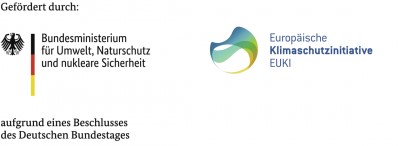Green Rural Deal Project

The farewell from coal has long begun. The Biden Plan for a Clean Energy Revolution and Environmental Justice and the EU Green Deal are plans for a resource-efficient sustainable economic development. Accordingly, the question is no longer if, but when and how we shift towards a sustainable carbon-neutral economy and ensure that the transition is just. However, what does just transition mean for rural regions? Regions, where trends like depopulation, brain drain, and high level of unemployment are overlapping with new ones like decarbonization and energy transition. The Green Rural Deal project addresses this question together with regions affected in three countries of the Balkans: Greece (Western Macedonia), Kosovo (Kamenica), Serbia (Priboj) and two reference regions in Germany (Lusatia and Emsland) and five project partners: Wuppertal Institute, Germanwatch, Balkan Green Foundation, RES Foundation as well as a Local Government Association of Western Macedonia.
34 MW farm – but still no green policies in Kamenica, Kosovo

The Municipality of Kamenica is located in the eastern part of Kosovo, with total residents of around 36,000 and a strong capacity for the workforce: active population (16-65 years) sums up over 65%. As it is one of the municipalities with the richest variety and volume of ores and minerals, its economy is based mostly on the construction material industry. The new wind energy farms with a capacity of 34.8 MW, though a governmental project was put online almost two years ago, shows positive signs for the region. Furthermore, the geographical proximity to the capital – Prishtina – as well as national policies focused on city development may possibly stop migration. On the other side, the municipality lacks green energy prioritization policies as well as a specific department dealing with energy division within the Municipality. The current medium-term budgetary framework does not foresee any investments in renewable energy sources, while briefly mentioning the support for the investments in energy efficiency measures.
Opportunities mainly lie in its geographical position (capacity for wind and solar exploitations), the EU and other international support, i.e. donor programs for cross-border cooperation. Then again, when analysing priorities, the focus is more on maintaining or upgrading existing infrastructures such as green spaces, rather than investments in energy efficiency and renewable energy sources. What is more, the Covid-19 panedmic amplified the already high unemployment rate of around 45%, leaving many residents in need of social care or in search of migration.
Commitment to climate and energy policies but still room for improvement of the implementation in Priboj, Serbia

Priboj is a small municipality in southwest Serbia with a population of around 25,000 and a remote, hilly region with almost 65 % of forest cover. In contrast to Kamenica Municipality, Priboj shows political commitment to climate and energy policies. For instance, the transition to locally available biomass in the district heating system will be completed in 2021 as well as the renovation of public buildings for improved energy efficiency. Furthermore, private households are also supported in improving their energy efficiency. On top of this, there is a richness of natural resources, including the lake, Priboj spa, Lim River; as well as a local entrepreneurship spirit in the SMEs sector. Yet, the municipality lacks local strategic documents and reports on the implementation of past plans and indicators to monitor the implementation of planned measures. In addition, socio-economic concerns have to do mainly with lack of job opportunities and knowledge related to climate, energy and environment.
Priboj’s opportunities lie on the promises for expanded usage of locally available wood biomass as well as the institutional and technical potential for local energy community projects, i.e. energy cooperatives or crowdfunding. Besides, there is a growing interest in rural tourism in Priboj and surroundings where local development opportunities could arise from rural tourism and energy transition showcase. Then again, demographic trends display a continuous decline of the population in the municipality, with the young generation either moving to more developed and large cities or migrating to EU countries. Lack of job opportunities, economic and energy poverty such as electricity cuts in winter conditions and recently the Covid-19-pandemic did not help to ease the economic problems.
Post-Lignite transition challenges of Western Macedonia in Greece

Unlike Kamenica and Priboj, the Region of Western Macedonia is divided into the regional units of Grevena, Kastoria, Florina and Kozani-the capital of the region. Located in the northern part of Greece, the regions core industry is mining sector– where 70% of Greece’s total electricity power is produced. Nevertheless, the Region of Western Macedonia does not represent an attractive investment environment that could improve the productivity and the benefit of products and services generated in the region. What is more, Research and Development activities are slow with the national or international trend that leads to a low innovation and hence low economic development. On top of that, the unemployment rate is around 27%, the country’s highest unemployment rate (especially in the ages of 18-25) and one of the highest regional unemployment rates in the EU. Consequently, the Region of Western Macedonia, like Kamenica and Priboj, has a negative demographics trend where its residents move to more developed regions or countries.
National as well as EU funding, namely the transition master plan by Governmental Committee and Just Transition Fund, represent opportunities for creating new economic activities with a focus on green economy and upscaling the use of Renewable Energy Sources. Then again, rigid as well as long-term transition dialogues without actual and quicker results, aggravate the transition in the region. Another threat is the lack of a specific portfolio for the reclamation of land and repurposing represents a threat to the region. On top of that, steadily increasing unemployment rates as well as an unattractive investment environment intensify population reduction and immigration.
Outlook of the Green Rural Deal Project
Wuppertal Institute, Germanwatch, Balkan Green Foundation, RES Foundation and Local Government Association of Western Macedonia are working in a bottom-up co-creational process together with core regional stakeholders to develop capacities for a transition to a zero-carbon economy in each of the three target regions: Greece, Kosovo, and Serbia. Likewise, we aim to enable stakeholders in an evidence-based decision-making process for sustainable development. That is, local stakeholders will be empowered to use and employ a variety of different tools, methods and strategies to design future-oriented and sustainable development pathways, where they will receive a tailored mix of capacity building and knowledge support.
Next, we are supporting local processes with co-creational workshops for regional stakeholders as a catalyst for transformative projects and policies. Implementing the co-created projects and strategies will lead simultaneously to a decrease of carbon emissions in the rural regions and promote transformative low-to-zero-carbon pathways in the respective countries. Finally, we aim to help to exchange and learn across regions with study tours for practitioners. Successful implementation of the project will contribute to a low-to-zero-carbon regional development and serve as a "proof of concept" that a low-carbon transformation in the frame of the EU Green Deal can be implemented and provide multiple benefits – even for the most deprived regions.

